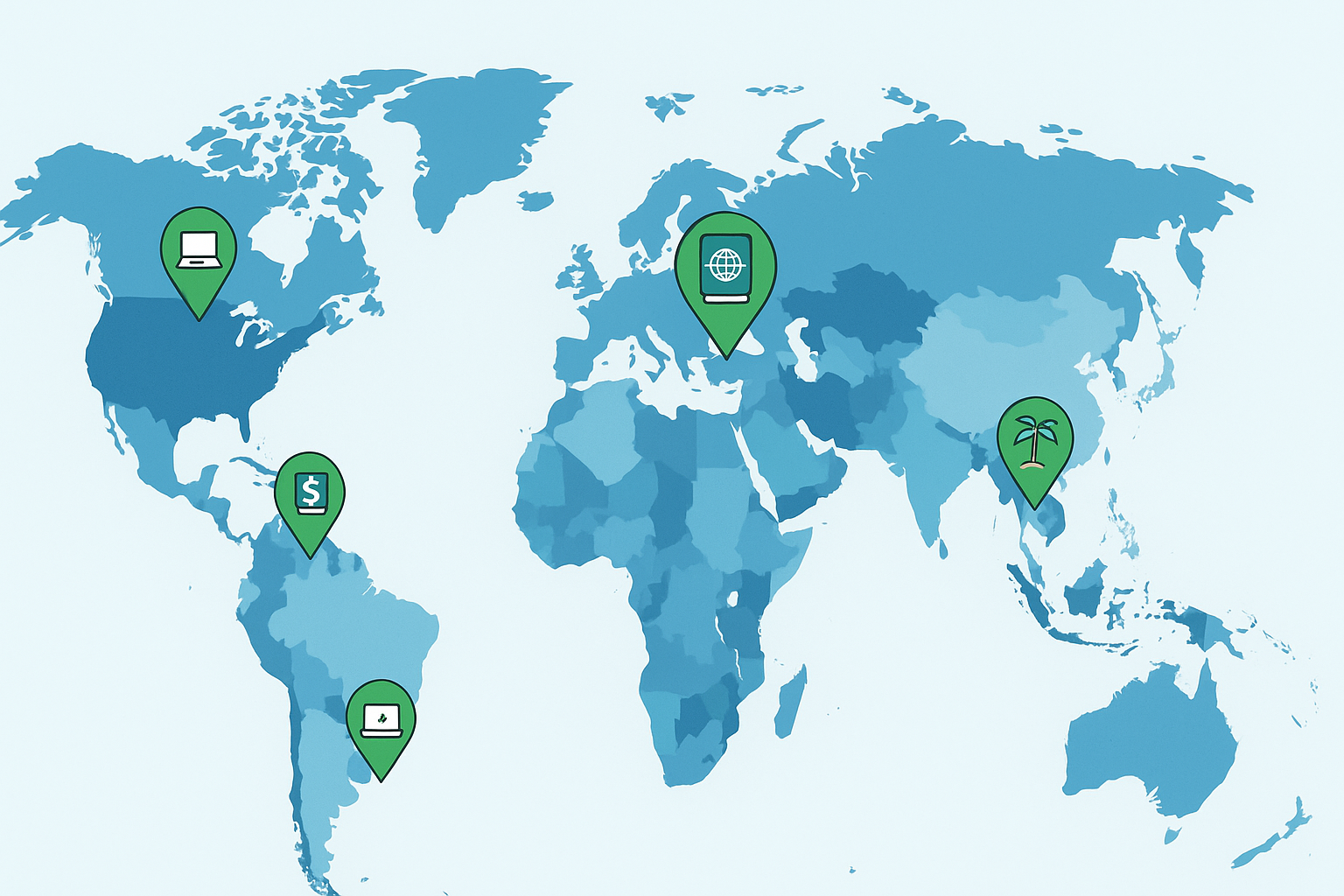Remote Work Visas 2025: Top 10 Countries to Live and Work Tax-Efficiently
Meta Description: Explore ten prime countries in 2025 offering remote-worker or digital-nomad visas — tax-friendly regimes, visa terms, and key requirements.
1️⃣ Introduction
In 2025, more countries are offering visas tailored for remote workers — enabling professionals to live abroad while earning from clients or employers elsewhere. Choosing the right destination involves not only visa eligibility, but also tax-residency implications, local tax rules on foreign-earned income, and cost of living. Many digital-nomad visas, such as those in Panama, Thailand and Costa Rica, offer tax exemptions or reduced tax liability on foreign-earned income. ([myexpattaxes.com](https://www.myexpattaxes.com/expat-tax-tips/top-5-digital-nomad-visas-in-2025-for-us-expats/))
2️⃣ What to Consider When Choosing a Remote Work Visa
- Income requirement: Minimum monthly or annual income you must demonstrate.
- Duration & renewability: How long the visa is valid and whether it can be renewed or leads to residency.
- Tax treatment of foreign income: Is it exempt, taxed at a reduced rate, or subject to full local tax?
- Residency threshold: Day-count criteria (e.g., 183 days) that trigger local tax residency.
- Connectivity & lifestyle: Internet reliability, cost of living and remote-work infrastructure.
3️⃣ Top 10 Countries to Consider in 2025
- United Arab Emirates (Dubai): 0% income tax and straightforward remote-worker visa.
- Costa Rica: Digital-nomad visa; foreign-earned income not locally taxed under certain rules.
- Croatia: One-year remote-work visa with tax exemptions for qualified applicants.
- Barbados: “Welcome Stamp” visa—no local tax on foreign income for a 12-month stay.
- Antigua and Barbuda: Up to two-year remote-worker visa with tax exemptions.
- Spain: Startup Law visa offering flat 24% tax rate on foreign income (limited period).
- Portugal: Digital-nomad visa; flat-rate income tax options via the NHR scheme (subject to updates).
- Mexico: Temporary-residence visa ideal for remote professionals with moderate taxation.
- Greece: Digital-nomad visa with partial tax exemptions for foreign-sourced earnings.
- Malta: Remote-worker residence program with favourable tax residency structure.
4️⃣ Summary Comparison Table
| Country | Tax Treatment (Foreign Income) | Minimum Income Requirement |
|---|---|---|
| UAE | 0% personal income tax | ≈ US$3,500+/month |
| Costa Rica | No local tax on foreign income | ≈ US$3,000/month |
| Croatia | Tax-free for 1 year under visa | ≈ €2,500+/month |
| Barbados | No local tax on foreign income | ≈ US$50,000/year |
| Antigua & Barbuda | No local tax on foreign income | ≈ US$50,000/year |
| Spain | Reduced flat tax ~ 24% | ≈ €2,760+/month |
| Portugal | Flat-rate regime ~ 20% (NHR) | ≈ €3,280+/month |
| Mexico | Standard local tax; low cost of living | ≈ US$2,600/month |
| Greece | Partial tax exemption | ≈ US$30,000/year |
| Malta | Reduced tax rates for residents | Varies |
5️⃣ Key Tax & Compliance Notes
- Home-country obligations: U.S. citizens and some others remain liable for worldwide income tax even when abroad.
- 183-day rule: Staying beyond this period may trigger local tax residency regardless of visa type.
- Double-taxation treaties: Check if your home country has agreements to avoid double taxation.
- Local registration & insurance: Some countries require local health-insurance coverage or registration.
FAQs
Q1. Which countries have zero income tax for remote workers?
A1. UAE, Antigua & Barbuda, and Barbados currently offer visa options with 0% local income tax for foreign-sourced earnings.
Q2. How long can I stay under these visas?
A2. Most digital-nomad visas last from 6 months – 2 years, with some offering extensions or conversion to residency.
Q3. Do I need to pay taxes back home?
A3. That depends on your citizenship. U.S. citizens, for example, must still file and pay federal taxes even if living abroad.
Conclusion
Remote-work visas in 2025 provide global professionals with the chance to live abroad and optimise tax exposure legally. The best destination depends on your income level, visa requirements, and home-country tax rules. Whether it’s Dubai’s zero-tax environment, Europe’s structured programs, or the Caribbean’s lifestyle benefits, the key is understanding both the opportunity and the compliance side before relocating.
References
- Nomad Embassy — Digital Nomad Visas with No Tax (2025 Edition)
- Global Citizen Solutions — Best Countries for Digital Nomads 2025
- Citizen Remote — Digital Nomad Visa Countries List 2025
